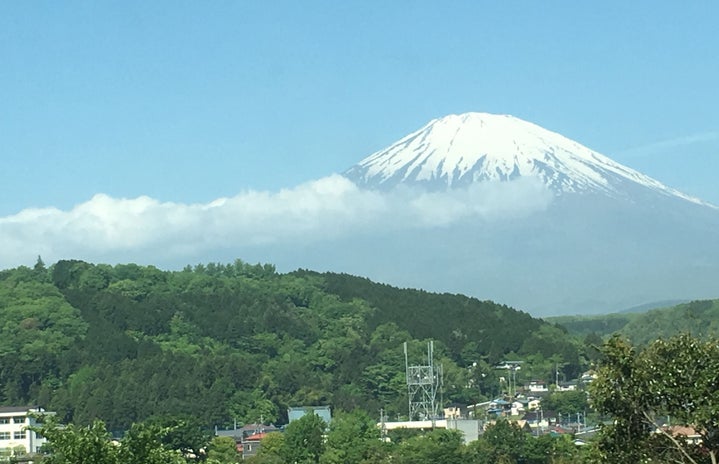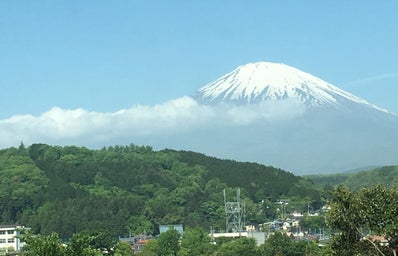1. Learning another language is one of the coolest things.
Learning another language is extremely practical. My mother tongue is in fact French, English being my second language. I never imagined I’d ever learn a third language, but I ended up doing so with Japanese! While it isn’t perfect and it’s still something I try to practice every day, learning a new language is an asset I recommend everyone do. As an avid reader, learning an additional language opened my eyes to a whole new set of available books, media, music, etc. While I know many people enjoy music and TV in languages that they do not speak such as Kpop or Kdrama, being able to appreciate a culture’s media while understanding it is something that fills me with joy to this day. Japanese TV comedy is still to this day one of my favourite ways to de-stress from University – and I can’t forget to mention amazing Japanese music!
2. Being different is totally okay.
Living in a foreign country, especially one that is so focused on the aspect of being petite and adorable is something that can take a toll on your personal image. It’s in fact not considered rude to comment when someone you know has gained weight in Japan. Remarks such as this, while being frowned upon here in Canada can definitely mark you. You stand out like a sore thumb, have a different body shape than the rest of the girls in their school uniforms, but, that’s okay! Embrace yourself for who you are, weight, height, and race. I’ve learned to feel comfortable with who I am, and have also managed to refine my style. Fashion in Tokyo was certainly different than here and found myself really enjoying it as it wasn’t nearly as revealing as what I was used to back home.

3. Japanese cuisine is by far better than Canadian cuisine – there’s nothing you can tell me to change my mind!
Eating in Japan has completely changed the way I perceive food – I seek out delicious, fresh, yet still healthy foods. It amazed me how ingrained the idea of fresh food was within the culture. At each of my host families (I’ve had three during my 5-month exchange), food was always something that the family would spend more money on. It was essential for them to be eating foods that not only made them happy but also made them feel good afterward – unlike what eating pizza or heavy lasagna would do. Japanese cuisine generally consists of several small dishes put together to make a varied, yet not overfilling portion. On another note, many cafeteria foods here include things such as burgers, fries, and poutines. The cafeteria at my high school was filled with fresh meals prepared every morning, such as fried rice, soups, salads, omurice, etc. Even convenience store meals were generally healthy and affordable unlike in Canada – never-mind finding something healthy at a konbini (convinience store) in Canada!
I also discovered that I really really enjoyed fish and seafood! I’m also still into the habit of eating my favourite Japanese comfort foods on rainy weekends when I spend the whole day working on assignments. My favourite comfort dish is 卵ご飯 (egg rice)! Although it may seem a bit off-putting for those who aren’t into trying more “daring” foods, the dish is made by cracking a raw egg or two on top of a steaming hot bed of rice, mixing it thoroughly with it along with soy sauce to make a creamy mixture.

The image above shows what a regular lunch would be like in Japan. There is red bean rice, tofu (egg flavoured), a cold miso soup, a salmon salad, fresh tomatoes (I lived on a farm), and finally, cold tea.

The image above shows what I would eat from a convenience store on days where my host mother would not want to cook – tuna/mayo onigiri (rice ball), red bean rice onigiri, a salad as well as a drink. The total of everything above came to around 10 Canadian dollars, which still amazes me to this day.
4. I’ve made friends that I will never be able to forget
Friendships are the one thing I will treasure the most from my exchange. I’ve met wonderful people while abroad, one in particular who became my third and final host family for a total of three months. Riri and I still communicate to this day on a weekly basis and we’ve been talking about going to visit one another in the next few years. I wish I could just be done university already so I can go and visit my host family again!
Friends are also a major part in adjusting to a long-term exchange program. You find yourself alone in a country where you don’t speak the language, which leaves you in a pretty vulnerable position. My friends not only helped me adjust to the cultural changes, but they also helped me learn about their culture itself, their values and the language. Forcing yourself and trying your best to speak the language is the best method to learn it as you’re desperately trying to form a bond with someone. It may seem difficult at first, but it definitely gets easier over time!
I would love to post pictures of my lovely friends in this article, but due to cultural differences and their ideology of privacy, posting a photograph of them in this article would be considered rude on my part and I respect their wishes.
5. Cultural festivals are a big part of Japanese culture, and taking part in them was amazing
My first host family was very strong on the ideology of cultural festivals. My host father participated in them nearly every week, and we went to see him perform on several occasions. This was, however, only an introduction to the joyous evenings I’d spend bonding with my host family and friends. My third host family owned a shinto shrine, which meant it was extremely important for them to upkeep it. I was also part of a smaller rural community that hosted their fair share of omatsuri – summer festivals. This meant I got to spend many occasions eating delicious street foods, dance and watch amazing displays of fireworks.
My best friend Mami took this picture of me while I was dressed in a traditional Japanese yukata. Riri, Mami, and I were at a 2 hour long hanabi (firework) festival in Tokyo. The yukata was a gift from his parents since I helped him get into his dream university by practicing his English with him for several hours a day. I am forever thankful for the gift!

6. The final and most important thing that my exchange has taught me was to follow your dreams.
My exchange school emphasized this on a regular basis – what are your dreams? What are you striving to accomplish? At the time, I simply wanted to get into university, be finished as quickly as possible, and settle. I also wanted to go into accounting as it was something that came easily to me and I couldn’t be bothered to strive for anything else. Yet, while accounting is an amazing profession, it was definitely not something I knew I would be happy doing on a daily basis. These constant reminders reminded me that you were the orchestrator of your own life. With that in mind, I decided to follow my dreams and strive to get into veterinary school as I always have wanted to do since I was a child.


All photos are owned by me, Emilie Kelly


